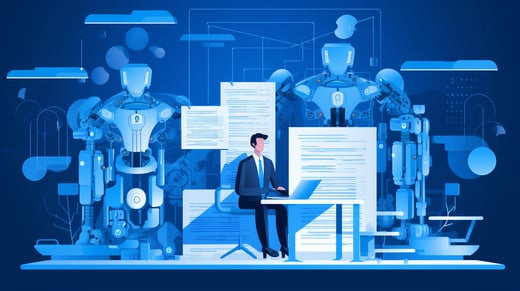Learn more about the three types of artificial intelligence delivered by the ThoughtRiver platform.
“We want AI, but we do not know why”
Artificial Intelligence (AI) is a term used a lot to describe smart technology without always being understood. It is a stamp of innovation that is often accepted unchallenged, with the assumption that it must be clever and it must work well.
As lawyers we know about the dangers of making assumptions and not prying further into the details. This holds true with legal AI too. Not all AI is created equal, and what is often described as artificial intelligence isn’t strictly AI. Applying caution and asking questions is essential.
A recent survey reveals the importance of this debate. While 32% of legal professionals believe that AI and machine learning will be part of their technology roadmaps in 2021, another 42% are uncertain or not sure about how it fits into the business strategy overall.
Lawyers know that legal tech cannot merely be dismissed as hype or a flash-in-the-pan fad. There is plenty of evidence to demonstrate the benefits of automating contract reviews, for example. Businesses that choose to ignore the potential of legal technology are those likely to be left behind as digital transformation delivers an overwhelming competitive advantage.
So let’s demystify some of the mystery behind the AI label and clarify exactly what it means and how it delivers benefits.
AI in action
Among the firms who already rely on AI as part of their legal operations, nearly half use AI for contract review and negotiations, and 86% say they use AI for legal research.
But how exactly that happens is often a black hole.
The truth is that while over half of lawyers expect to see transformational change in their firms from technology like AI, big data and analytics, fewer than one quarter say they understand them.
Let’s answer some of those questions for complete transparency. Here are the three areas of AI that ThoughtRiver uses to deliver huge benefits to in-house legal professionals.
1. Playbook AI
Most enterprises will have a playbook defining what terms are and are not acceptable from a commercial point of view. This means that no new contract review should start from scratch; there are predefined policies and agreed wording that should always be followed (unless there is justifiable reason to do otherwise).
This playbook should be written down and captured, and not limited to the minds of a few individuals within the organisation.
ThoughtRiver digitises this playbook, providing a digital asset that can be referenced at speed and at will. Each new contract is also digitised on the ThoughtRiver platform as part of an initial contract review.
With both the playbook and new contract in a structured format, ThoughtRiver’s AI can then cross reference the two together and highlight any wording that legal needs to review.
There are multiple benefits delivered here:
- The lawyer does not need to read the whole contract – only the areas he or she is alerted to. This saves a huge amount of time, not to mention removing the grind of monotonous contract reviews that are essential but low-value and unenjoyable tasks.
- ThoughtRiver enables lawyers to insert approved wording with just a single click. Again, this saves the time and effort needed to revert back to an analogue playbook of approved wording and manually type in the new copy into the contract.
- With ThoughtRiver’s AI conducting the first review of every contract directly against your playbook, a lawyer need not be involved at this stage. So sales and procurement, for example, can quickly and safely self-serve legal services with no additional risk. The relevant parties are the new contract, ThoughtRiver’s AI, and the digitised playbook. To a large degree, the person conducting the review is irrelevant.
2. Familiarity AI
By digitising contracts at the point of initial review, your portfolio of contracts becomes a structured and easily interrogated data set. Their contents convert into data points that are perfect for fast and effective analysis.
As part of each new contract review, ThoughtRiver will trawl through this existing portfolio and a database of similar contracts to see if specific terms or wording in the new contract have appeared before.
ThoughtRiver’s AI will alert you to how common or uncommon the contract terms are when compared to both your historical contracts, and the broader database of similar contracts. In this manner, junior lawyers can easily become experienced beyond their years.
ThoughtRiver gives you enough information for you to make the best decision.
3. Digital issues list
Creating an issues list that contains all issues that need to be resolved before a contract can be signed is considered to be best practice in deal making. But in reality they do not always happen, except for when negotiating the biggest or most valuable contracts. Frankly, they are a pain to create and manage, and therefore easy to overlook or push back.
ThoughtRiver’s AI removes this pain. A digital issues list is automatically created for each and every contract, no matter how big or small. Everyone can quickly see who owns each issue, and their status. This means that nothing is overlooked, all stakeholders have full transparency, and issues can be resolved faster without the manual grind.
AI does not replace humans, but makes them better lawyers
Artificial intelligence works best when it complements human experience, creativity, problem solving, and decision making. This is the crucial thing to remember when discussing the relative merits of AI. The right AI is another tool to help humans become better lawyers.
AI needs to be trained to understand what to look for, and how to respond when it finds it. It needs to serve a clear purpose, such as removing tedious manual or repetitive work. How it works should be transparent, so you know what it is and is not capable of, and so too much is not expected of it.




